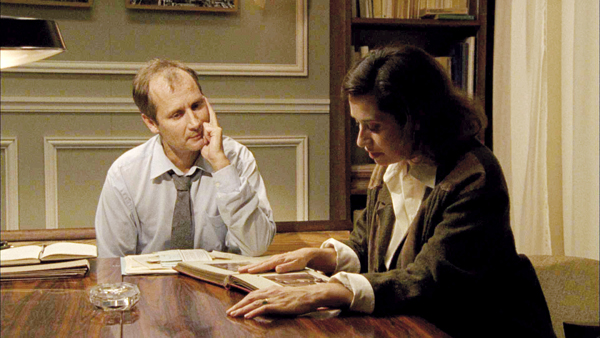|
Reviews of Recent Independent, Foreign, & Documentary Films in Theaters and DVD/Home Video

ONE DAY
YOU’LL UNDERSTAND One Day You’ll Understand may be Israeli director Amos Gitai’s most conventional and unchallenging feature film in topic, technique, as well as politically. But he still brings a fresh eye to what will always be difficult: coming to grips with the Holocaust. For France, where Gitai lives part-time, the televised 1987 crimes against humanity trial of Klaus Barbie set off a national soul-searching. During the Occupation, Barbie earned the sobriquet of “Butcher of Lyon” as the head of the Gestapo there. His trial and French collaboration became the subject of Marcel Ophüls’ 1988 documentary Hotel Terminus: The Life and Times of Klaus Barbie. One Day is set against the trial, with testimony playing constantly in the background. For Victor Bastien (Hippolyte Girardot), the issue of complicity is personalized within his family. Obsessively, he searches for evidence for what happened to his maternal grandparents, the Gornicks, and the possible involvement of his paternal Catholic relatives. Through Jeanne Moreau’s elegant performance as his mother Rivka, there is exquisite sympathy for how survivors avoided talking about their experiences for decades, in contrast to today’s obsessions with memoirs and confessions. Rivka deftly deflects her son’s tentative approaches with affirmations of maternal affection and protection. Her final, serene acknowledgement of her Jewish origins at a yizkor (memorial service), however, has surprisingly less impact. But that may be because I’ve witnessed overpowering and undimmed expressions of grief for years at such services in my Queens neighborhood where many refugees and survivors from the Holocaust settled, such that younger generations (me included) fled at the sight rather than probe further. Based on an autobiographical novel (not available in English), Gitai uses Jérôme Clément’s story to pointedly delve into the issue of assimilation through intermarriage and the loss of identity. The French here come across less noble than the German gentile wives of arrested Jews in Margarethe von Trotta’s Rosenstrasse, though the emphasis here is more on post-war admissions of guilt than wartime survival. Where many films by innovative directors today turn surprisingly old-fashioned in depicting World War II-era events, including Paul Verhoeven (Black Book) and Spike Lee (Miracle at St. Anna), Gitai employs a visual immediacy by bringing a contemporary consciousness to flashbacks, supplemented by Louis Sclavis’s beautiful score that offers a different theme and instrumentation to each strand of the family. The very emotional, climactic scene where Victor visits his grandparents’ 1944 refuge and vividly imagines their arrest has the same impact as Gitai’s portrayals of the 1973 war in Kippur and Disengagement’s 2005 police vs. Jewish settlers confrontations. Gitai rarely films a speaker full on, keeping the camera instead on the reactions of the listeners. Sometimes the symbolism of such shots gets too heavy, like when the focus is on a rabbit in a cage instead of on Moreau, but his expressive adult actors are up to the intense scrutiny of the lens (though the young teen actors playing Victor’s children are stiffly awkward). In several scenes, the camera subtly reveals clues to a past that Victor is only beginning to glimpse—women in fur coats are reminders of his grandfather’s confiscated furrier business and an ignored samovar hints at his family’s Russian roots (my family has similarly held on to such a samovar while no longer knowing how to use it). However, Victor and his family have
clunky arguments about identity (“Who are we? French? Russian? Jews?
Catholics?”) and forgetting the past (“You can’t change history. You
can’t undo what’s done.”). When Victor listens to
dispassionate Holocaust researchers review the archival paper trail of what
happened to the Gornicks, Gitai pushes the theme of facing history much
further, heavy-handedly, as the bureaucrats then officiously tote up the
war reparations. But despite
the back
and forth between awkward and moving, unsubtle and touching, Gitai does make a strong case for personal reexaminations of the past.
Nora Lee
Mandel
|

